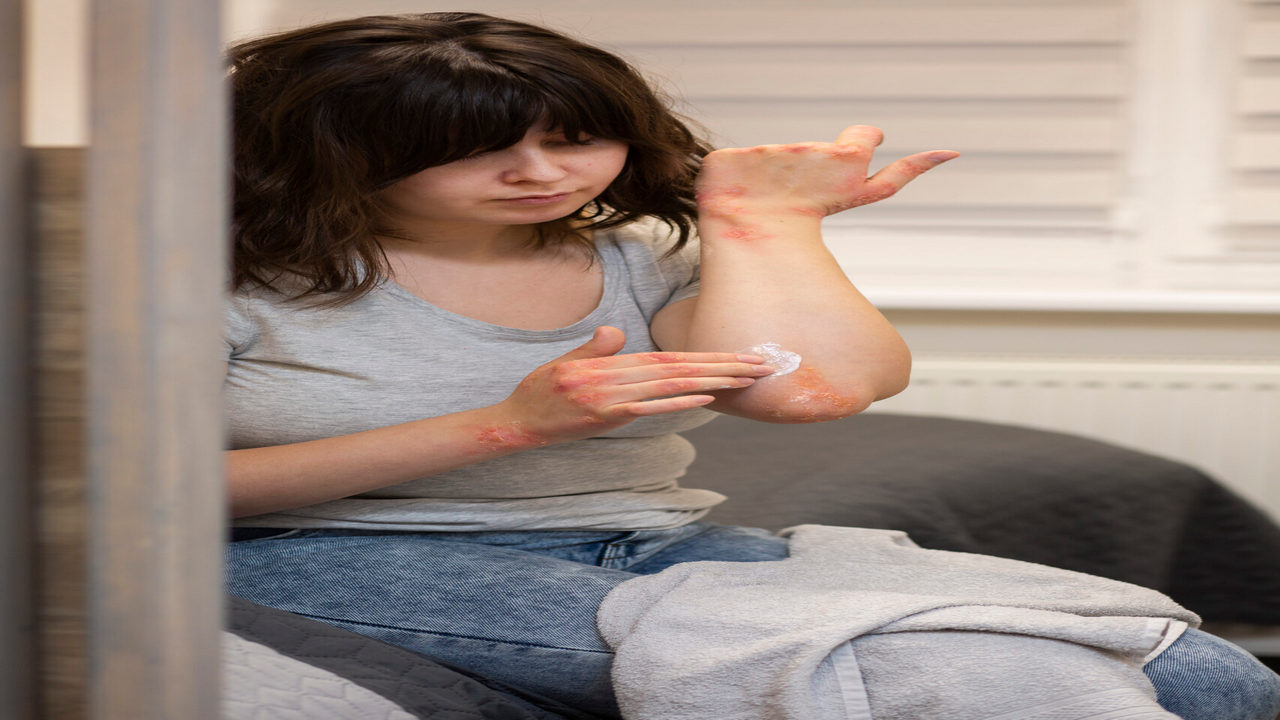What is Eczema?
Eczema is not only dry skin, but it is chronic skin disease that leads to inflammation, redness, itching and even blisters or sores. Eczema may be the offender, especially that painful itching or roughness that appears and disappears, particularly in the areas of the skin that have to touch.

Eczema vs. Dermatitis: Are They the Same?
Yes, pretty much! Dermatitis means inflammation of the skin and Eczema of the skin is a kind of dermatitis. That is, every dermatitis is eczema and not every eczema is dermatitis.
How Common is Eczema Globally?
It has an impact of more than 200 million individuals in the world. It is common mostly among children, though not by exception among adults. Research indicates a prevalence of up to 20 percent of children and 10 percent of the adults with some type of eczema.
Types of Eczema
Atopic Dermatitis
It is the most prevalent and normally begins during childhood. It frequently is a familial condition that is associated with asthma and hay fever.
Contact Dermatitis
Activated by exposure to allergens or irritants such as soaps, detergents or metals.
Dyshidrotic
Small, itchy blisters on hands and feet?Painful but treatable.
Nummular
The absence of a typical pattern on the skin, this condition is characterized by coin-shaped patches. It is confused with fungus infection.
Seborrheic Dermatitis
This type, which is often found on the scalp (hello, dandruff!), is related to excess of yeast.
Stasis Dermatitis
Commonly in the lower legs, and associated with bad circulation and varicose veins.
Early Signs of Eczema
Common Initial Symptoms
- Itchy skin (even before the rash appears)
- Dry, sensitive patches
- Red or inflamed areas
- Small raised bumps
- Cracks behind ears, elbows, or knees
Warning Signs in Children vs Adults
In infants, it appears in the cheeks and the head. In adults and in older children, it occurs more in the folds of elbows, knees, and wrists.
What Causes Eczema?
Genetic Factors
When your parents have it, asthma or hay fever, you are more likely to have it, as well. The genetic material you have has an impact on the protective barrier of the skin as well as the physical immune system.
Environmental Triggers
Flare-ups can be caused by cold weather, pollution, hard water, harsh soaps, etc.
Immune System Imbalance
It commonly arises due to the hyper response of immune system to irritants or allergens which in turn results in close-ups of the skin.
Who is at Risk of Developing Eczema?
- Babies and young children
- People with a family history
- Individuals with asthma or allergies
- People who are exposed to severe chemicals or dry season.
How is Eczema Diagnosed?
Physical Exam
This disease is normally diagnosed through an examination of your skin by the doctor who then talks to you about your symptoms and medical history.
Patch Testing and Allergy Tests
These assist in pointing to certain allergens or irritants which could be causing your condition.
When Should You See a Doctor?
See a doctor if:
- The itching keeps you up at night
- OTC drugs are ineffective.
- In case your skin presents with signs of infection, i.e., pus, crusts or swelling.
- It is impacting your day to day life or state of mind.
Eczema Triggers You Should Avoid
Common Food Triggers
Eggs, dairy, gluten, and nuts may cause flare-ups in some individuals.
Weather and Environmental Factors
Cold, dry air and hot, humid conditions can both aggravate condition .
Skincare and Personal Care Products
Scented lotions, harsh soaps, and even some “natural” products can worsen condition.
Effective Treatments for Eczema
Topical Treatments
- Corticosteroid creams
- Calcineurin inhibitors
- Moisturizers (fragrance-free and hypoallergenic)
Oral Medications
- Antihistamines for itching
- Immune suppressants for severe cases
Light Therapy (Phototherapy)
UV light therapy may lessen inflammation and make your skin look better.
Natural and Home Remedies
- Oatmeal baths
- Coconut oil
- Aloe vera gel
Always consult a doctor before trying home remedies.
Best Skincare Routine for Eczema-Prone Skin
- Use lukewarm water (not hot!)
- Moisturize and do it in a 3-minute period after bathing.
- Choose gentle, non-scented cleansers
- Pat dry—don’t rub
- Apply barrier creams before exposure to irritants
Lifestyle Tips to Manage Eczema
Diet and Hydration
- Omega-3 rich foods (like flaxseeds, salmon)
- Drink plenty of water
- Eat no processed foods and too much sugar.
Stress Management
Stress is a HUGE trigger. Try yoga, meditation, deep breathing—or even a hobby you love!
Clothing Choices
Wear breathable, cotton fabrics. Stay away from irritating fabrics like wool or synthetics.
Myths About Eczema – Debunked
- Myth: Eczema is contagious.
Truth: Nope! It cannot be caught in someone. - Myth: Only kids get this.
Fact: It is not limited to adults (even first time). - Myth: You simply have to use more moisturizers.
Fact: Moisturizing is helpful, though it does not pose a solution to the underlying inflammation.
Long-Term Outlook: Can Eczema Be Cured?
There’s no permanent cure—yet. But the good news? It can successfully be addressed with the help of proper care. It is outgrown by many children, and learned by adults with conscious efforts.
Conclusion
Eczema may be a very exasperating experience, full of frustrating itchiness and sometimes embarrassment. But you are not alone–and you are not powerless. Know the knowledge of your triggers, a good skincare routine and consulting medical assistance when it is necessary may do wonders. This is a process, whether you have just been diagnosed or long time warrior. And every small step counts.
FAQs
Mayank Rawat
Certified Skincare Consultant and passionate researcher, I specialize in exploring skincare ingredients and haircare actives. Always eager to stay ahead of trends, I continuously update my knowledge to bring science-backed solutions. Dedicated to helping others achieve healthy skin and hair through expertise and innovation.